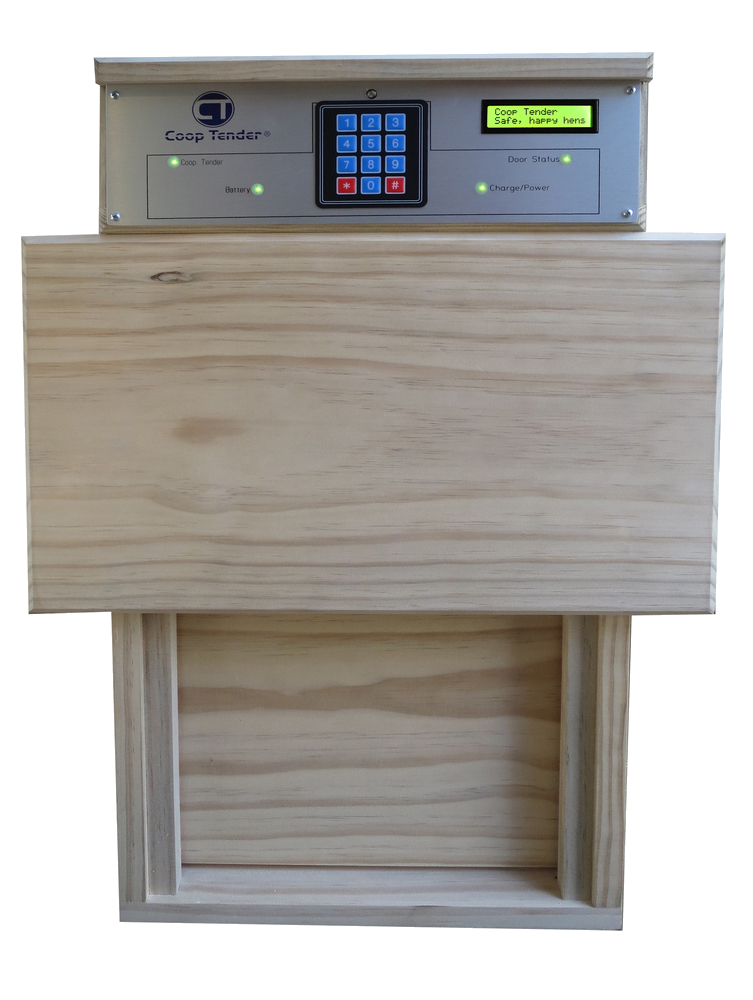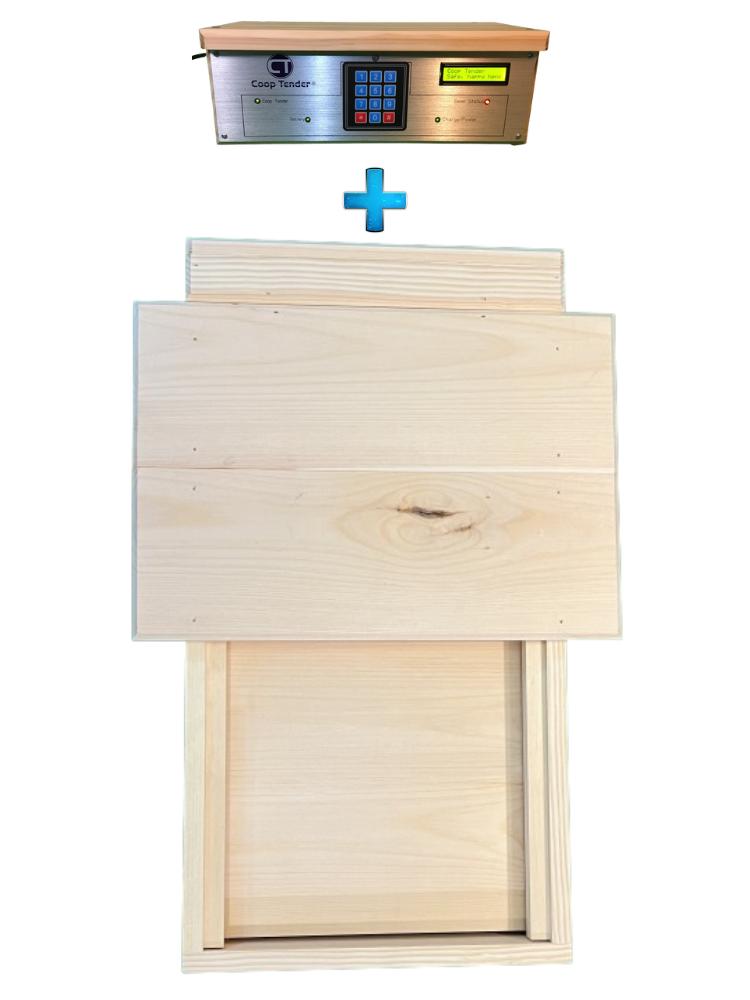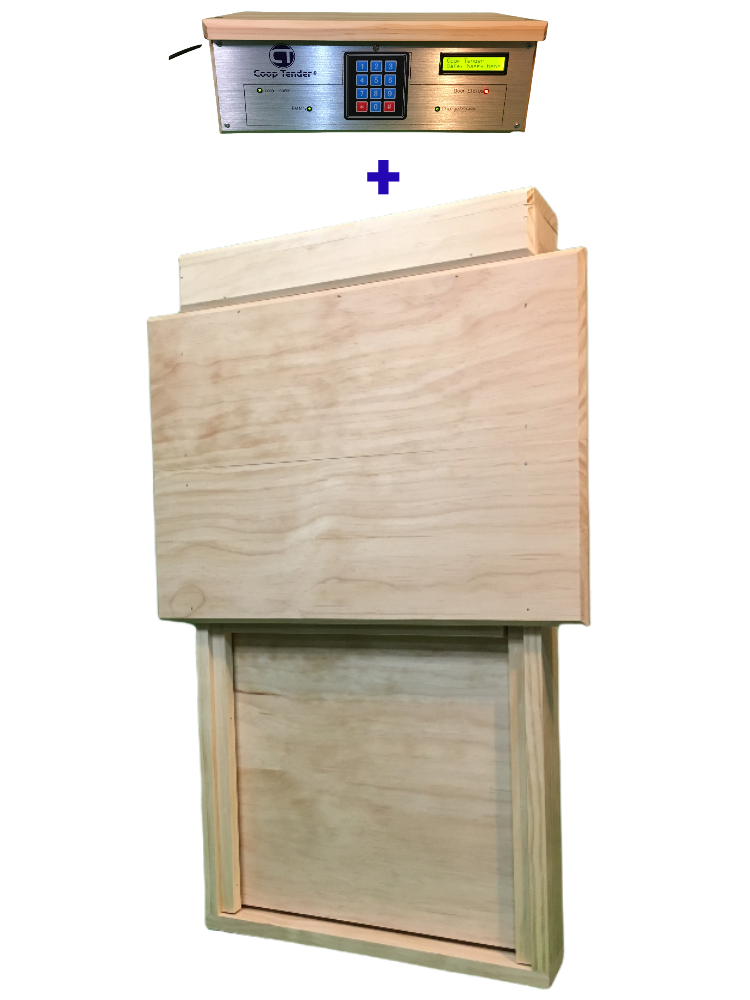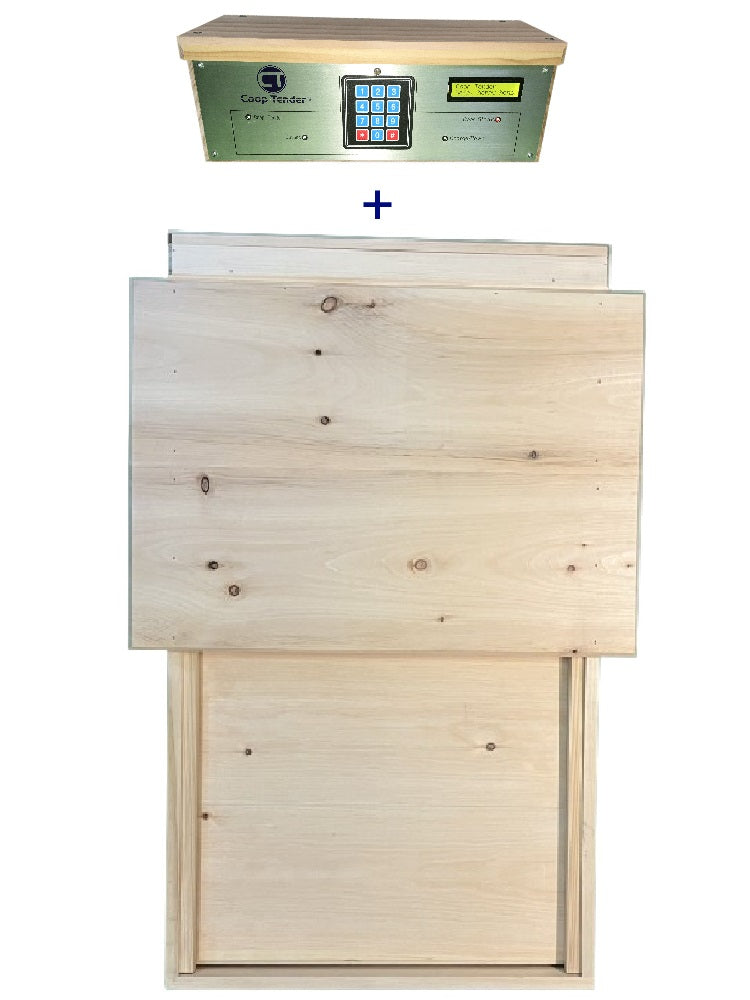When it comes to maintaining a chicken coop, one of the most effective investments is a chicken coop automatic door. These ingenious devices not only enhance convenience but also provide your feathered friends with added safety. However, just like any other mechanical equipment, the longevity of a chicken coop automatic door can vary based on several factors. In this blog post, we will explore the lifespan of automatic chicken doors and discuss aspects that influence their durability.
Quick Answer
High-quality automatic chicken coop doors typically last 10-15 years with proper maintenance. Steel worm drive systems like Coop Tender's last longer than cable/pulley systems, with our doors showing 95% operational success after 10 years of field testing. Factors affecting lifespan include drive mechanism type, weather exposure, and maintenance frequency.
Understanding Automatic Doors for Chicken Coops
Before diving into how long these doors last, it’s essential to understand what a chicken coop automatic door is. This device acts as a door that opens and closes automatically at specified times, or based on light sensors, allowing chickens to enter and exit the coop without human intervention. This feature is particularly beneficial for those who have busy schedules or want to maintain a security standard against predators.
Lifespan of Automatic Doors for Chicken Coops
The durability of a chicken coop automatic door varies significantly based on construction quality and drive mechanism type. Premium automatic chicken doors with steel worm drive mechanisms last 10-15 years, with 95% still operating after 10 years in our field studies. Budget models with cable drives average 5-8 years before requiring major repairs or replacement.
Understanding these lifespan differences is crucial for calculating total cost of ownership. A $400 premium door lasting 15 years costs $27 per year, while a $150 budget door lasting 5 years costs $30 per year—making the premium option both more reliable and economical long-term.
Quality of Materials
One of the main factors influencing the lifespan of a chicken coop automatic door is the quality of the materials used in its construction. Doors made from robust materials like solid wood are designed to withstand the elements and offer a longer service life. Conversely, doors made from lower-quality materials may experience wear and tear more rapidly, shortening their lifespan.
Exposure to Weather Conditions
Another crucial factor is exposure to varying weather conditions. a chicken coop automatic door that are constantly subjected to extreme conditions such as heavy rain, snow, or direct sunlight may deteriorate more quickly. Additionally, humidity can affect the door mechanics, so it's wise to consider weatherproofing or wood sealer measures or placing the door in a sheltered location to improve its longevity.
Maintenance Schedule to Maximize Lifespan
Proper maintenance can extend your automatic door's life by 3-5 years while preventing costly emergency repairs.
Monthly Check (5 minutes)
- Visual inspection for obstructions in door track
- Check LED status indicators for error codes
- Test manual override function to ensure accessibility
- Verify door opens and closes at expected times
Quarterly Service (15 minutes)
- Clean light sensor surface with soft, dry cloth
- Lubricate all moving parts with marine-grade waterproof grease
- Check all electrical connections for corrosion or looseness
- Test battery backup system by unplugging AC power temporarily
Semi-Annual Deep Check (30 minutes)
- Inspect door frame and mounting screws for tightness
- Clean debris from controller housing ventilation
- Test all programming modes (dawn/dusk, schedule, manual)
- Check WiFi connectivity and update firmware if available
Annual Maintenance (45 minutes)
- Replace backup battery (typically every 3-5 years, but check annually)
- Apply fresh coat of wood sealer to lumber components
- Inspect and clean solar panels if equipped
- Professional inspection recommended for high-use commercial installations
Warning Signs Requiring Immediate Attention:
- Door operates noticeably slower than normal
- Unusual grinding, clicking, or motor strain noises
- Intermittent operation or random opening/closing
- Error codes displayed on control panel
- Door doesn't fully open or close
- Visible rust, cracking, or component damage
Features That Affect Longevity
When investing in automatic doors for chicken coops, consider specific features that can impact durability and lifespan.
Motor Type
Drive Mechanisms: The Key to Longevity
The drive mechanism is the most critical factor determining your automatic door's lifespan and reliability.
Steel Worm Drive Systems (Recommended)
- Lifespan: 10-15 years
- Advantages: Self-locking design prevents predators from forcing door open, weather-resistant solid steel construction, precise operation
- Maintenance: Low - lubrication every 6 months
- Best For: Maximum reliability, security, and longevity
- Failure Rate: Less than 5% within 10 years
Cable and Pulley Systems
- Lifespan: 5-8 years
- Advantages: Lower upfront cost, simple design concept
- Maintenance: High - cable replacement every 2-3 years, frequent tension adjustments
- Common Issues: Cable stretch and fray, weather damage to pulleys, predator manipulation
- Best For: Budget-conscious buyers accepting higher long-term costs
Linear Actuator Systems
- Lifespan: 7-10 years
- Advantages: Smooth, quiet operation, good for noise-sensitive locations
- Maintenance: Moderate - seal replacement, debris cleaning from tracks
- Limitations: More complex electronics, higher power consumption, vulnerable to debris
- Best For: Urban settings where noise is a concern
Door Mechanism
Different designs come with varying door mechanisms – some are sliding, while others swing open. Understanding which type might be more susceptible to mechanical problems can help you make a more informed decision when purchasing.
Safety Features
Safety features, like an anti-pinch system or sensor-based opening, can not only protect your chickens but also enhance the longevity of the door by preventing accidents that could cause mechanical failure.
Cost Analysis: Automatic Door Investment vs. Replacement
Understanding total cost of ownership helps you make the smartest long-term investment for your flock.
Total Cost of Ownership (15-Year Period)
Premium Steel Worm Drive Door (Coop Tender Style):
- Initial cost: $400
- Maintenance supplies: $150 (lubricants, occasional parts)
- Replacement parts: $100 (battery replacements)
- Total: $650 ($43/year)
- Operational years: 15
Budget Cable Drive Door:
- Initial cost: $150
- First replacement (year 6): $150
- Second replacement (year 12): $150
- Maintenance & repairs: $300 (cables, adjustments, service calls)
- Total: $750 ($50/year)
- Units purchased: 3 doors over 15 years
Additional Hidden Costs of Frequent Replacements:
- Installation labor: 3x the work with multiple units
- System downtime: Chickens vulnerable during replacements
- Predator losses: Cable systems fail more often, risking flock safety
- Frustration factor: Dealing with repeated failures and repairs
Benefits of Longer-Lasting Premium Doors:
- Prevented predator losses: $300-500+ saved over door lifetime
- Reduced maintenance stress: Fewer emergency repairs and replacements
- Consistent flock protection: Better egg production from secure, happy chickens
- Property value: Quality automation increases homestead value
Frequently Asked Questions About Automatic Chicken Door Lifespan
How long should I expect my automatic chicken coop door to last?
A quality automatic door with a steel worm drive mechanism should last 10-15 years with proper maintenance. Cable and pulley systems typically last 5-8 years due to component wear and weather exposure.
What are the most common failure points in automatic chicken doors?
The three most common failure points are: 1) Drive mechanisms (cables break, gears wear), 2) Electronic controllers failing in extreme temperatures, and 3) Door tracks becoming obstructed or warped from weather exposure.
How can I make my automatic chicken door last longer?
Regular maintenance every 3 months: lubricate moving parts with marine-grade grease, clear debris from tracks, check battery voltage, and inspect mounting hardware for looseness. Store spare batteries and fuses for quick repairs.
Are expensive automatic doors worth the extra cost?
Yes - premium doors cost 2-3x more upfront but last twice as long with significantly less maintenance. A $400 door lasting 15 years costs $43/year versus a $150 door lasting 5 years at $50/year, while providing superior predator protection.
Do solar automatic doors last as long as electric ones?
Solar and electric versions have identical mechanical lifespans since they use the same door mechanisms. Solar panels typically last 20+ years, while backup batteries need replacement every 3-5 years regardless of power source.
What warranty should I expect on an automatic chicken door?
Quality manufacturers offer 1-2 year warranties on electronics and mechanical components. Premium brands may offer extended warranties on drive mechanisms. Avoid products with less than 1 year coverage as this indicates lower confidence in durability.
How do weather conditions affect automatic door lifespan?
Extreme temperatures can stress electronics, though quality doors operate from -20°F to 185°F. UV exposure degrades plastic components over time. High humidity accelerates metal corrosion. Premium doors include weather-resistant materials and coatings to handle these conditions.
When should I replace versus repair my automatic chicken door?
Replace if: repair costs exceed 50% of new door price, multiple system failures occur within one year, or the door is over 12 years old. Repair for: single component failures, minor weather damage, software issues, or battery replacement.
Do steel worm drive doors really last longer than other types?
Yes - steel worm drives have only one moving part (the threaded rod) versus multiple failure points in cable systems (pulleys, cables, tensioners). The solid steel construction resists weather damage better than cables and plastic components.
How much maintenance does a 10+ year old automatic door typically need?
Well-built doors require minimal maintenance even after 10 years: quarterly lubrication, annual battery replacement, and occasional cleaning. Poor-quality doors may need major repairs or replacement by year 8-10.
Automatic Chicken Door Lifespan Comparison
| Drive Mechanism | Expected Lifespan | Annual Cost* | Maintenance Schedule | Predator Security | Best For |
|---|---|---|---|---|---|
| Steel Worm Drive | 10-15 years | $27-43/year | Every 6 months | Excellent (self-locking) | Long-term reliability, maximum security |
| Cable/Pulley | 5-8 years | $30-50/year | Every 3 months | Good (when functioning) | Budget buyers, temporary setups |
| Linear Actuator | 7-10 years | $35-45/year | Every 4 months | Very Good | Quiet operation priority, urban settings |
| Chain Drive | 6-9 years | $40-55/year | Every 3 months | Good | Heavy door applications |
*Annual cost calculated as (purchase price + maintenance + repairs) ÷ lifespan years
Key Takeaways from Lifespan Data:
- Steel worm drives offer the best value despite higher upfront costs
- Cable systems require the most frequent maintenance and replacement
- All systems benefit significantly from regular maintenance - neglect can cut lifespan in half
- Weather protection extends all system lifespans by 2-3 years on average
Making the Right Choice for Long-Term Success
The lifespan of automatic doors for chicken coops ranges from 5-15 years, with the drive mechanism being the primary determining factor. Steel worm drive systems consistently deliver the longest service life at 10-15 years, making them the most economical choice despite higher initial investment.
When evaluating automatic door options, consider these key factors:
For Maximum Longevity: Choose steel worm drive mechanisms with solid wood construction and weather-resistant electronics rated for your climate zone.
For Best Value: Calculate total cost of ownership over 10-15 years, including purchase price, maintenance, and replacement costs. Premium doors often cost less per year of service.
For Peace of Mind: Select doors from manufacturers offering comprehensive warranties and responsive customer support. Your chickens' safety depends on reliable operation.
For Future-Proofing: Consider WiFi-enabled models that allow remote monitoring and firmware updates, extending functional lifespan as technology evolves.
Investing in a high-quality chicken coop automatic door with proper maintenance will provide decades of reliable service, protecting your flock while giving you the freedom to maintain your busy lifestyle. The difference between a 5-year door and a 15-year door often comes down to choosing quality components and following a simple maintenance routine.
Your chickens deserve consistent protection, and you deserve equipment that works reliably year after year. Choose wisely, maintain regularly, and enjoy the peace of mind that comes with premium automation technology.







Leave a comment